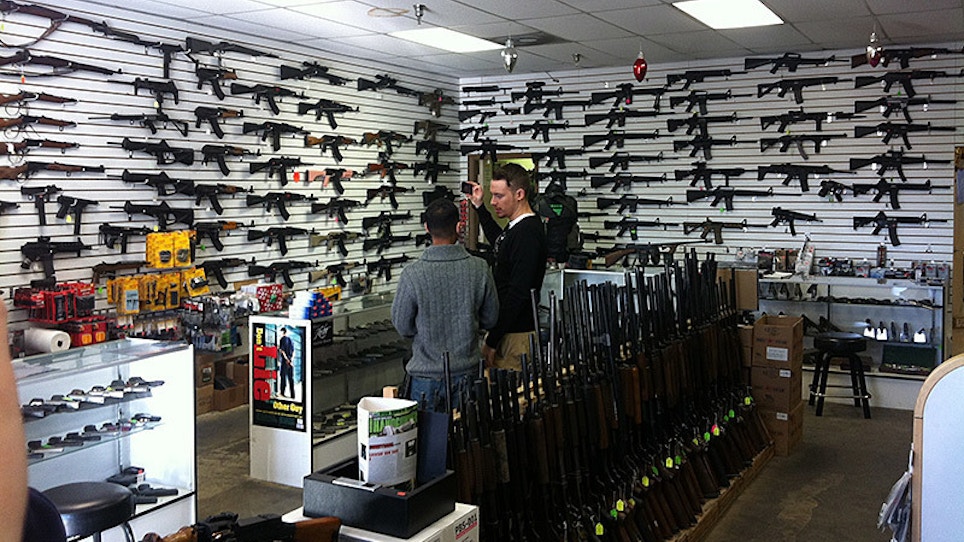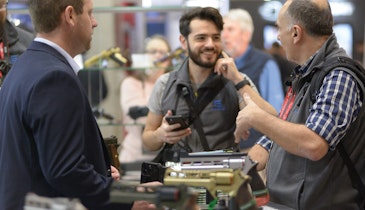I’d been there before.
Whether they recognized me or not, I couldn’t tell, as they were preoccupied with more important things. One was playing solitaire on his dust-covered 2003 Dell computer. Another was texting on his cell phone — just pretending to go through the motions of being attentive. The last was sitting in a chair behind the counter, staring off into space as if he was two-thirds of the way through a bad heroin trip.
You could cut the air with a knife. Apparently all the smile in the room had been used up before I got there.
I’ve never felt less welcome in a retail joint. Even though I’d probably spent north of a couple large in the store over the past year or so, they didn’t seem to care. Did they recognize me from my previous visits? I doubt it.
I approached the counter, noting that the store was emptier than an Oprah’s Book Club meeting at Attica Penitentiary, and asked for help.
“Do you carry any reloading supplies?”
“Nope,” replied the texter, not even looking up from his phone.
I knew that he cared less than a New York cabbie in the last hour of an all-night shift when I looked over my shoulder and spotted primers, a dozen or so canisters of smokeless powder and some basic reloading hardware.
While I pondered my next move, feeling more uncomfortable than a Mayors Against Illegal Guns member serving corn dogs at a Friends of NRA banquet, I noted the store owner breaking his Solitaire deadlock by stacking a nine of clubs up top. Good for his score, but not so much for my spending propensity. Meanwhile, my attentiveness-challenged sales associate had still not managed to look up from his phone.
Not sure whether to browse the used gun inventory or ask for more help, I turned and left.
A scene from a bad film noir flick? Unfortunately, it’s a true story. I know because it happened to me recently. If you’d asked the management and staff of that particular store how their day went not five minutes after I left, they probably would have simply responded, “slow.” I doubt they had any idea of what a poor impression they made. I’d be even more shocked if they had any inkling of how uncomfortable the whole experience was for me, the prospective customer.
Heck, I wasn’t even prospective; I was an existing customer — the kind you want to keep at all costs. You know, the folks who can’t seem to leave an interesting gun at a reasonable price in the glass case.
Fortunately, this type of experience is far less common than it used to be, but the average gun store customer service experience still lags far behind that of other industries. Clothing stores, restaurants, hotels and even grocery stores would have short tenures indeed if they offered the type of service I experienced. But rather than complain about some bad experiences, let’s turn this story into an opportunity to learn some tips from some of the best in the business.
Service Is Money
Developing a culture of good customer service gets a bad rap. Just the word “service” implies degradation to some, but that completely misses the point. Service is money. Why?
According to consulting firm Bain and Company, a 5 percent increase in customer retention can yield a 75 percent increase in profits. Gartner Group statistics indicate that 80 percent of your future profits will come from just 20 percent of your customer base. And Lee Resource, Inc. finds than it costs five times more to sell to a new customer than an existing one.
Even the notable Ritz Carlton Group strives for fanatical service levels — not as a lofty aspiration of its own, but to make money. According to Paul Hemp, senior editor at the Harvard Business Review, who spent a week in training at the Ritz Carlton in Boston Common, general manager John Rolfs is very clear about his mission.
“The owners of this hotel opened it for only one reason — to make money. Our job is to help them make money. And how do we help them make money? No matter what our work is and no matter where we do it in the hotel, our job is to make guests feel good, so they come back.”
It’s that simple.
Architecting your business practices to make customers want to come back sounds easy for multi-billion-dollar hotel and real-estate chains who have money to spend on trainers and programs. How do you instill these same money-making principles if you’re a small business with limited staff and budget?
Let’s consider a few ways you can lose the bad gun salesman cliché forever.
Good Customer Service Doesn’t Start With Customers
The first, and perhaps most important, step toward developing an effective customer service culture doesn’t even require customers. To illustrate this point, one need look no further than the Ritz Carlton’s motto: “We are Ladies and Gentlemen serving Ladies and Gentlemen.” The important takeaway from this motto is the “we are Ladies and Gentleman” part.
The smart folks at the Ritz understand that it’s impossible to expect staff to treat customers like ladies and gentleman if that very same treatment is not expected amongst each other. Sincere and warm service is not an act that can be turned on and off at will. It’s a feeling. If you develop a culture in your business where employees are expected to treat each other like ladies and gentleman, the next step of extending that to customers will be much, much easier.
I’ve spent countless hours working in the fast-paced and frenetic environment of restaurants. During the stress and chaos of Friday night dinner rush, it’s easy for tempers to flare. In the kitchens of the good restaurants you’ll hear chefs, dishwashers and wait staff using lots of “sirs” and “ma’ams” when talking with each other — especially at the most chaotic of times. In a high-stress environment, the simple habit of shouting a “Thank you, sir!” across the kitchen helps keep things calm and respectful.
When the chef preparing the food and waiter delivering the food feel respected, they carry that attitude to the customer table.
It’s no different in your retail business. Make your expectations known, then start your own personal campaign of catching your people doing something good. When you hear them treat a co-worker with a high level of respect, be sure to acknowledge and thank them for it. Catch someone doing the right things a few times, and they’ll make it a habit.
Observation Precedes Attentiveness
In a marketing seminar years ago, I listened to hotel chain VP of marketing talk about his approach to customer service. To him, customer service marketing wasn’t about fancy ads and brochures; it was about observation and attentiveness.
He installed cameras at the entrances, lobbies and common areas in a number of the chain’s busier hotels — and then spent countless hours watching the tapes so he could empathize with customer experiences. This project took place back in the 1990s, when roll-aboard suitcases become all the rage.
What did he see? Most of the hotel chain’s properties had a short staircase leading from the street to the lobby. Customers would exit taxis then drag their wheeled suitcase up a flight of steps, bumping and thumping all the way. By the time a customer bounced their way to the front desk, they demonstrated a noticeable increase in frustration. Hmmm. Ramps, he thought, and promptly installed them as a roll-aboard-friendly option to stairs. That’s the kind of observation and attentiveness that makes a customer have a better experience.
I relate this story not to encourage rampant and wanton ramp construction, but rather to illustrate the importance of observing what your customers do and say. How can you be attentive to what your customers would value and appreciate? Look for clues in their shopping and buying behavior.
If someone buys multiple magazines, maybe she’s a competitive shooter. Ask her if she is, and offer to show her the newest Maglula magazine loader.
Or perhaps she grumbles when she hears you’re out of Budget Blaster 9mm ammunition. Assume that maybe she wants to buy that type of ammo in the future when you do have it, and offer to send her an email when it comes in. Yes, that’s extra work, but it won’t only help you sell another box of ammo — it will also tell that customer that you care, and she’ll be more likely to trust you for other purchases as well. Attentive service is all about noticing, and acting on, the little details. Customers appreciate it.
Anticipation Is The Best Type Of Service
The Ritz trains employees to anticipate what a guest is wanting and to meet that request before they have to ask. Everybody is on the lookout for clues so they can anticipate need. Room service waiters notice if there are two suitcases in a room and remember to bring an extra mug, even if only one person orders coffee. If a housekeeper notices that a desk has been moved closer to the window, they’ll file a note so that the room is prepared that way when the guest returns in the future.
You don’t have to be the Ritz to provide anticipatory service. One of my most memorable service encounters was at a used hubcap store. Somehow I’d managed to knock a hubcap off my 2003 Buick Century.
The hubcap business was on a four-lane road in the industrial part of town. I turned left, pausing in the turn lane for a brief moment, and proceeded into the lot of Hubcap Kingdom. I had only gotten halfway out of my car when a rough-looking guy approached me with a large plastic bag. He was grinning ear to ear as he opened it to show me, you guessed it, a hubcap for my Buick.
He’d noticed the missing front drive side hubcap while I was turning left and had gone to fetch just what I needed — without my having to ask. Service wasn’t just prompt, it was completed before I got there. It’s just that simple, and you can guess where everyone I know goes for car wheel parts.
Cheers Had It Right All Along
Sometimes you want to go where everybody knows your name, and they’re always glad you came. Wait, that’s the Cheers theme song, isn’t it? No matter, it’s still legit.
The pharmacy team at my local Target makes me feel good, and not just from the drugs. Almost every time I go there, regardless of which employee greets me, they do it by name, and most of the time they already have my prescription pulled by the time I get to the front of the line. It always puts a smile on my face and instantly changes my disposition for the better.
Everyone likes to be remembered, because that implies sincere appreciation. How they manage to do this has me stumped. I pick up a prescription once a month. In between my visits, 17 billion other people come to that counter. How on earth do they know who I am? I don’t think they have any high-tech recognition systems in place. It’s far more likely that the manager of that pharmacy department emphasizes personal service and reinforces the value of greeting customers by name. In other words, they work at it.
Yes, I know, in a retail business it’s hard to get your staff to remember every customer’s name. But other businesses manage to do it, and I bet Target sees a lot more faces than the average gun store. One way to help is to have your employees greet and introduce themselves by name. More often than not, the customer will do the same. Then you and your staff have the opportunity to use that customer’s name during the sales interaction. Repeated use of the customer’s name makes it far more likely that you’ll remember it on their next visit. You’ll also likely remember other details like what kind of gun they shoot so you can be prepared to show them the latest relevant products when they come back.
It’s Time To Focus On Service
During the great customer gun grab of 2013, good service didn’t really matter. In desperation to buy, and with product in short supply, customers would put up with just about anything to get what they wanted. But those days are over, and now the industry is back to normal, so timeless business principles like customer retention, word-of-mouth marketing and satisfied customers still apply.
It’s time for gun salespeople like those I mentioned up front to mope quietly into their recliners, and stay there. With statistics showing more younger, urban and diverse (read women) shooters entering the market, it’s a sure bet that “too cool for school” salesman of old isn’t going to make your business any money. I’m a longtime shooter, and even I won’t buy from stores where those salespeople work.
Do your own math. What if only half of your customers this month were so happy with their experience that they would buy their next product from you without shopping online or at another store nearby? Think that would make a difference in your bottom line?






